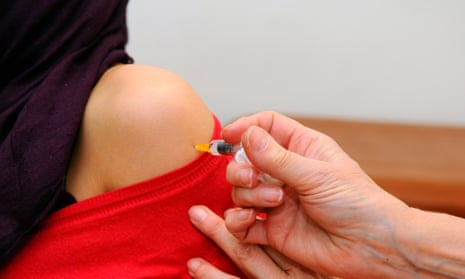Few things terrify parents more than the threat of meningitis. Any fever might turn out to be this most horrible and rapid of diseases, early signs of which are easily missed by medics (let alone by unqualified NHS 111toilet telephone operators).
The biggest petition signed in parliamentary history calls for vaccination of children up to the age of 11 against meningitis B. After the death in February of two-year-old Faye Burdett, the campaign really took off. But the department of health has ruled against mass vaccination, restricting this to infants of two to four months old. Why? Because, says the department, it would not be cost effective.
The organiser of the petition, Lee Booth, responded, saying: “It beggars belief, really, that the government are putting costs ahead of saving children’s lives.”
That’s a heartfelt cry, echoed by most citizens in such pleas for lifesaving treatments. At a time when the NHS has never been so brutally squeezed financially, its share of UK GDP spending falling lower year by year, his protest might sound reasonable.
But on the principle behind this one, the government is right for once. All health spending is rationed, and it always will be, regardless of who is paying, whether that’s private insurance companies or the state, through the taxpayer.
That means there have to be rules as to which treatments or vaccination programmes are good value for money, taking into account what else that money would buy and how many other lives could be saved or improved by it.
The health economist Prof Alan Maynard is one of the devisers of the QALY concept, or the quality-adjusted life year. This is the system used for measuring how much health gain is produced for each pound spent for any particular health intervention.
Currently, the rule of thumb is that a year of life of good quality is worth £30,000. That’s the scale the drug companies should work to when trying to sell a new drug to the NHS: if it costs more, or offers less, National Institute for Health and Care Excellence (Nice) should rule it out.
In 2014-15 there were 418 cases of meningitis B, 240 of them children; 25 people died. Maynard says meningitis B deaths are tragic, but for a vaccination programme “the benefits are positive but not great, while the costs are enormous. It’s a classic example of the opportunity costs, where you would deprive many other patients of things for which they would benefit.”
Labour set up Nice to benchmark drugs and treatments to provide a rational basis for rationing – one of it best acts. David Cameron, in opposition did what irresponsible oppositions often do, and supported a Daily Mail drive to provide the most expensive cancer drugs, which might prolong the very last stage of life for a few months longer.
By setting up a special cancer drugs fund he broke the principles of Nice, providing high-cost drugs regardless of their QALY benefits.
A recent report from the National Audit Office has just lambasted the fund’s operation. Not only did it bust its budget, letting drug companies rip, but there was no evaluation of how well those drugs did at extending life, or of the effects or value of them. As a result, the fund has been all but folded into Nice.
Rationing is a word politicians shy away from. It’s painful and distasteful to coldly calculate human life and suffering in hard cash. But someone has to, and committees comprised of experts, lay people and patient members are there to do it.
The joint committee on vaccines and immunisation has so far ruled that vaccinating all children against meningitis B is not value for money – and it takes a measure of fortitude for the politicians to bow to such expertise against a hailstorm of public opinion.
For some years, I was a lay member of the national screening committee, weighing up excruciating choices about which diseases it was worth screening for. There was great pressure for a universal prostate cancer programme, but at the time it failed to cross the threshold: the test provided many too many false negatives and false positives, and the treatment was uncertain. It would unearth many cases for treatment in people who would never have died of it. There was much protest from those who said it should be the men’s equivalent of the mass breast cancer screening programme.
But later the bowel cancer screening project did pass the test for efficacy, producing clear enough results and good enough life-saving treatment: good, value-for-money QALYs. Choosing health priorities means making cruel decisions; politicians are wise to leave it to experts and stay out of it.
As for saving lives, air pollution causes at least 40,000 deaths a year in the UK, according to new report from the Royal College of Physicians. Deaths aplenty could be avoided for relatively low cost in many fields – but nothing stirs up public indignation more than the NHS denying ultra-expensive treatments to save a few people.
Behind the scenes, cost is often a matter of drug companies scalping the NHS: Novartis was charging far too high a sum for the meningitis B vaccine. When it sold it on to GlaxoSmithKline (GSK), the price came down enough to make it worthwhile for the youngest babies. If GSK reduced the price further, that might yield enough QALYs to vaccinate all children. Money is at the wicked heart of many matters of life and death. Just ask the drug companies.









Comments (…)
Sign in or create your Guardian account to join the discussion